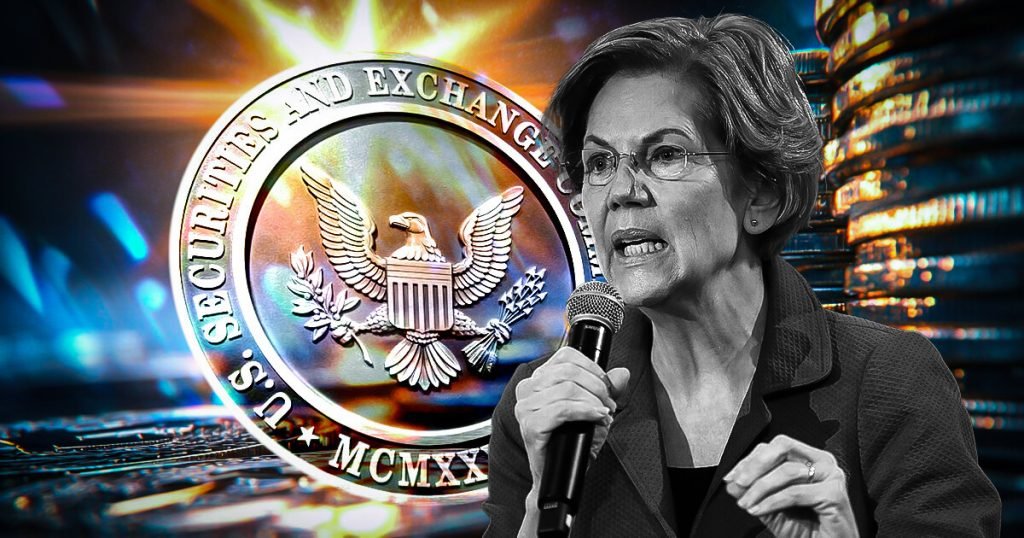Title: Senators Warren and Waters Demand SEC Transparency on Trump-Backed DeFi Venture World Liberty Financial
In a significant move that underscores rising scrutiny over political involvement in cryptocurrency, Senator Elizabeth Warren and Representative Maxine Waters called upon the U.S. Securities and Exchange Commission (SEC) on April 2 to preserve and disclose records concerning World Liberty Financial Inc. (WLFI). This decentralized finance (DeFi) project is reportedly backed by members of former President Donald Trump’s family, prompting lawmakers to express concerns over potential conflicts of interest that could influence SEC policymaking and enforcement actions. The urgency surrounding this inquiry reveals a growing apprehension among legislators about the intertwining of politics and crypto regulation, especially as the nation navigates an evolving legislative landscape regarding digital assets.
The impetus for the inquiry stems from reports indicating that Trump’s family has garnered majority control of WLFI, acquiring 75% of net token sale revenues and 60% of business operations, effectively translating to anticipated earnings of approximately $400 million. Warren and Waters’ letter calls into question whether these financial ties may skew the SEC’s regulatory and enforcement frameworks. While the request lacks legal authority to compel the SEC into action, it illustrates an elevated level of concern regarding how political connections may sway regulatory outcomes, particularly in light of the broader legislative efforts around stablecoins currently in discussion.
Prior to the request about WLFI, Senator Warren also raised concerns about potential conflicts of interest involving "Crypto Czar" David Sacks through a letter released on March 6. This communication followed Sacks’ revelations of profit from crypto holdings, particularly before Trump’s administration. The letter questioned the validity of Sacks’ profit made from his investments, adding more fuel to Warren’s search for transparency within White House crypto operations. These inquiries highlight a pressing need for clarity and accountability among influential figures in the cryptocurrency space, particularly those with political connections.
The timing of Warren and Waters’ inquiry coincides with a critical House Financial Services Committee session held the same day, where legislators debated proposed regulations for stablecoins. Notably, Waters expressed her strong opposition to any legislation that would permit Trump or his affiliates to own a stablecoin issuer, cautioning that doing so would create a dangerous precedent. She articulated that the ongoing stablecoin discussions should not facilitate the enrichment of politically tied individuals at the expense of the public. The proposed launch of WLFI’s USD1, a stablecoin pegged to the U.S. dollar, heightens concerns about the intersection of regulatory oversight and political favoritism in the digital currency realm.
The letter sent to SEC Acting Chairman Mark Uyeda also demanded the preservation of communications from the Trump White House regarding crypto dealings, specifically focusing on various members of the Trump family and their networking partners. Lawmakers are urging the SEC to clarify what mechanisms are in place to ensure that any potential conflicts of interest do not influence its decision-making process, particularly as they relate to unprecedented financial ties to the ever-expanding crypto industry. The inquiry emphasizes the importance of establishing robust safeguards against possible interference in regulatory actions that could disproportionately benefit powerful insiders.
Additional scrutiny is placed on the SEC’s handling of its recent case against Justin Sun, a prominent figure who wields significant influence as an investor and advisor within WLFI. Recent shifts within the SEC, notably during Uyeda’s leadership, have seen a retracing of aggressive enforcement actions initially championed by former Chair Gary Gensler. Instead, the current SEC approach focuses more on collaboration with the crypto industry, with some criticism directed toward the perceived leniency displayed in Sun’s enforcement case. With the SEC experiencing pivotal changes during this critical period for crypto regulation, the ongoing scrutiny from lawmakers serves as a reminder of the far-reaching implications that political connections can have on industry oversight.
As the SEC remains silent on the inquiries posed by Warren and Waters, the implications of the involvement of the Trump family in WLFI, coupled with the ongoing efforts to regulate the burgeoning stablecoin market, keeps the crypto industry on alert. A White House spokesperson has stated that Trump’s assets are held in a trust managed by his children, asserting that no conflicts exist; however, the continued calls for transparency from lawmakers indicate a growing necessity for the SEC to operate with a level of accountability that reassures the public and stakeholders alike. As the landscape of cryptocurrency evolves, the relationship between political entities and regulatory bodies will be crucial in defining the future of digital finance in the United States.
In conclusion, the inquiry by Senators Warren and Waters into World Liberty Financial not only highlights the complexities surrounding regulatory oversight in the cryptocurrency market but also calls into question the integrity of regulatory bodies within the context of political influence. As the SEC prepares to face increased scrutiny, it becomes imperative for the agency to maintain the trust of the public through transparency and strict enforcement, especially in a market with as much potential risk and reward as cryptocurrency. As the legislative framework around stablecoins takes shape, stakeholder vigilance is essential to ensure that regulations are equitable and just for all participants in the growing digital economy.


